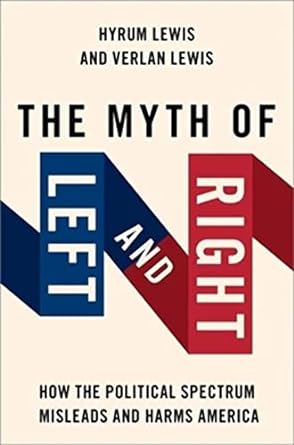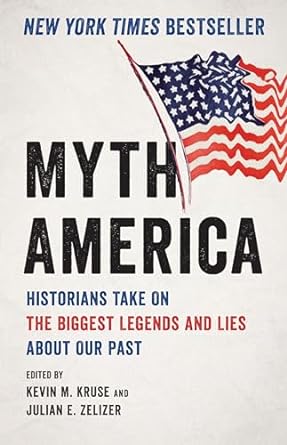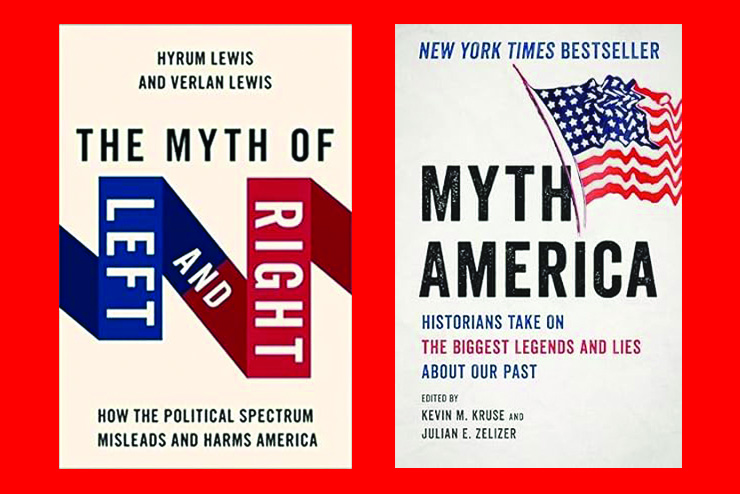
The Myth of Left and Right: How the Political Spectrum Misleads and Harms America, by Hyrum Lewis and Verlan Lewis (Oxford University Press; 168 pp., $9.99). This book by Hyrum and Verlan Lewis is yet another attempt to diagnose, explain, and reduce America’s political polarization. They aim to shift our political discourse to a more civilized plane, even if that means fewer windfall profits for Fox News and MSNBC.
At first, readers may have a tough time swallowing the book’s rejection of the essentialist theory of ideology, which they define as the belief that “distinct issues cluster together in ideological bundles because all political issues grow out of a single issue (an essence).” As the authors note, contradictions to essentialism abound. The so-called conservative George W. Bush expanded the warfare/welfare state with his Iraq War fiasco and Medicare boondoggle.
If you think religious belief divides left and right, recall liberal presidential candidate William Jennings Bryan, an evangelical Christian who stuffed so many Christian themes into his “Cross of Gold” speech that it sounded like the “King James Top Hits.” Conservatives oppose big government (but love big military). Liberals love big government (except in the womb, and at drag queen story hour).
The authors’ social theory of ideology trumps essentialism. Americans “are bound by a unifying tribe” rather than a single political essence, according to the Lewises. “Left” and “right” denote tribes, not philosophies.
Essentialism nevertheless persists. It is now “bleeding our republic to death,” increasing ideological dogmatism and political extremism and weakening incentives to compromise. Polarization blossoms where ideological thinking prevails.
What do “liberal” and “conservative” stand for anymore? The authors propose we use granular terms instead, such as “deficit hawk,” “immigration restrictionist,” or, to return the favor, my very own invention: “baby killers.” I’ll tone down that last one after the Lewises stop pretending to use Bill Kristol and John McCain’s bastardized definition of “isolationist” innocuously.
It’s hard to imagine how one can take the Lewises’ advice to “engage in adversarial collaboration” with intolerant ideologues who insist on the genital mutilation of children or who prioritize Ukraine over East Palestine, Ohio. I can’t imagine how we would go about “incorporating constructive disagreement into our lives” when the other side hates me because of my skin color, sex, and religion. But I will follow their recommendation to “find healthier tribes.” Time to reread Tocqueville.
(Mark G. Brennan)

Myth America: Historians Take On the Biggest Legends and Lies About Our Past, by Kevin M. Kruse and Julian E. Zelizer (Basic Books; 400 pp., $32.00). Despite its subtitle, this compendium of 20 essays does not attempt to expose the biggest legends and lies about the United States. Instead, most of the collection attacks America, Republicans, and white Southerners. The introduction gives the game away by confessing that hostility to Donald Trump and the right-wing media inspired the book’s creation. Yet a reader must question the editors’ standards when they complain that congressional Republicans worked to “block the teaching of popular histories such as the New York Times’ ‘1619 Project.’” The “1619 Project” is an excellent example of myth creation, yet the editors declined to examine it.
The first essays exemplify the book’s muddled message. Princeton’s David A. Bell asserts that it’s a myth that the United States is an indispensable nation because of its “exceptionally destructive role in world history.” No sooner does the reader digest this dispelled myth than Yale’s Akhil Reed Amar declares that America’s founding gave “rise to today’s world, in which democracies govern most of the planet’s inhabitants.” Will the real Myth America please stand up?
Most of the book’s contributors seem not to have understood the assignment, which was to expose and destroy myths, not to create new ones. The “myths” that they try to debunk include that only peaceful civil-rights protests work, that voter fraud exists, and that black riots trigger police violence rather than the reverse.
On the latter point, Yale University’s Elizabeth Hinton provides examples of black riots that police supposedly instigated, but her narratives about these incidents are simply dishonest.
The New School’s Natalia Mehlman Petrzela fails to debunk the “myth” that feminism is anti-family by attempting to redefine family and valorize single motherhood. Contrary to Petrzela, feminism’s agenda of expanded government money to subsidize abortion and maladaptive living arrangements does not support family values.
A few essays deserve praise. Politico’s Joshua Zeitz effectively shows that LBJ’s Great Society programs did, in fact, reduce poverty (though they ballooned in size beyond anyone’s imagination). And Princeton’s Julian Zelizer proves that the Reagan Revolution was more illusion than reality. Overall, however, the myths stand their ground. Myths are stubborn things.
(Betsy Clarke)

Leave a Reply